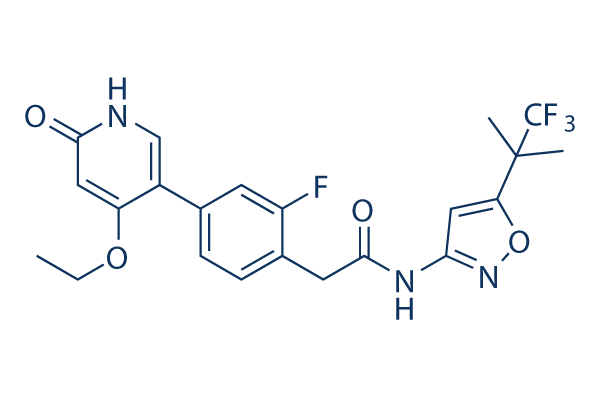research use only
GSK3179106 c-RET inhibitor
Cat.No.S8821

Chemical Structure
Molecular Weight: 467.41
Quality Control
| Related Targets | Bcl-2 Caspase PD-1/PD-L1 Ferroptosis p53 Apoptosis related Synthetic Lethality STAT TNF-alpha Ras |
|---|---|
| Other c-RET Inhibitors | AD80 YW-N-7 TFA TPX-0046 |
Solubility
|
In vitro |
DMSO
: 93 mg/mL
(198.96 mM)
Ethanol : 6 mg/mL Water : Insoluble |
Molarity Calculator
|
In vivo |
|||||
In vivo Formulation Calculator (Clear solution)
Step 1: Enter information below (Recommended: An additional animal making an allowance for loss during the experiment)
Step 2: Enter the in vivo formulation (This is only the calculator, not formulation. Please contact us first if there is no in vivo formulation at the solubility Section.)
Calculation results:
Working concentration: mg/ml;
Method for preparing DMSO master liquid: mg drug pre-dissolved in μL DMSO ( Master liquid concentration mg/mL, Please contact us first if the concentration exceeds the DMSO solubility of the batch of drug. )
Method for preparing in vivo formulation: Take μL DMSO master liquid, next addμL PEG300, mix and clarify, next addμL Tween 80, mix and clarify, next add μL ddH2O, mix and clarify.
Method for preparing in vivo formulation: Take μL DMSO master liquid, next add μL Corn oil, mix and clarify.
Note: 1. Please make sure the liquid is clear before adding the next solvent.
2. Be sure to add the solvent(s) in order. You must ensure that the solution obtained, in the previous addition, is a clear solution before proceeding to add the next solvent. Physical methods such
as vortex, ultrasound or hot water bath can be used to aid dissolving.
Chemical Information, Storage & Stability
| Molecular Weight | 467.41 | Formula | C22H21F4N3O4 |
Storage (From the date of receipt) | 3 years -20°C powder |
|---|---|---|---|---|---|
| CAS No. | 1627856-64-7 | -- | Storage of Stock Solutions |
|
|
| Synonyms | N/A | Smiles | CCOC1=CC(=O)NC=C1C2=CC(=C(C=C2)CC(=O)NC3=NOC(=C3)C(C)(C)C(F)(F)F)F | ||
Mechanism of Action
| Targets/IC50/Ki |
RET
(Cell-free assay) 0.3 nM
|
|---|---|
| In vitro |
GSK3179106 has a clean genotoxic profile with no embedded genotoxicity liabilities and possesses good kinase selectivity: only 26 out of a set of >300 recombinant kinases are found to be inhibited at a 1 μM test concentration. |
| In vivo |
Single dose IV (bolus, 0.06 mg/kg) PK in male Sprague-Dawley rats of compound GSK3179106 formulated as 0.04 mg/mL in DMSO/6% HP-beta-CD = 5:95 with a pH of 7 as a clear solution shows low exposure with an AUC of 102 ng·h/mL. Oral PK is evaluated with the same dosing regimen as the in vivo colonic hypersensitivity model, seven doses of 10 mg/kg given over 3.5 days. Full gut PK measurements are also taken to help understand the PK/PD relationship--It reveals high concentrations of this compound in the colon contents, jejunum, duodenum, and ileum, over that in plasma. |
References |
Clinical Trial Information
(data from https://clinicaltrials.gov, updated on 2024-05-22)
| NCT Number | Recruitment | Conditions | Sponsor/Collaborators | Start Date | Phases |
|---|---|---|---|---|---|
| NCT02727283 | Completed | Irritable Bowel Syndrome |
GlaxoSmithKline |
November 26 2015 | Phase 1 |
Tech Support
Tel: +1-832-582-8158 Ext:3
If you have any other enquiries, please leave a message.






































